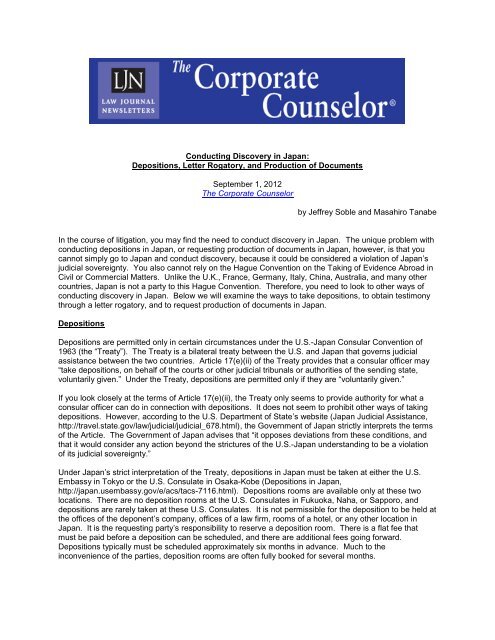Recognizing the Value of Letters Rogatory in International Legislation
Recognizing the Value of Letters Rogatory in International Legislation
Blog Article
The Function of Letters Rogatory in International Legislation: Trick Insights
Letters rogatory work as a pivotal instrument in worldwide legislation, helping with cross-border legal assistance by allowing jurisdictions to formally ask for proof and activities from one an additional. Rooted in historic criteria and defined with contracts like the 1970 Hague Convention, these demands are necessary for cultivating global participation. Their execution usually runs into substantial obstacles, including discrepancies in step-by-step delays and legal criteria, which can impede their effectiveness. Understanding the subtleties of this procedure raises critical inquiries regarding international collaboration and the prospective reforms needed to boost its dependability. What effects might these difficulties have for future lawful proceedings?
Definition of Letters Rogatory
In the world of international legislation, letters rogatory act as official requests provided by a court in one territory to seek aid from a court in one more territory. Letters rogatory. These requests are especially significant in cross-border lawful proceedings, where the enforcement of a court's order or the celebration of evidence may be restrained due to administrative limitations

The process typically requires the asking for court to verbalize the specific details or activity needed from the international court, adhering to the lawful procedures and conventions established in between the jurisdictions involved. As soon as provided, the letters rogatory are transmitted via diplomatic networks, which may consist of consular offices or embassies, to guarantee that the request is identified and acted on by the international court. Generally, letters rogatory exemplify the participating framework essential for reliable international lawful processes.
Historic Context
Although the practice of letters rogatory has old roots, its formalization within the structure of global legislation arised substantially in the 20th century. Historically, such ask for judicial help were utilized in different lawful customs, consisting of Roman law, where they assisted in cross-border cooperation in lawful issues. The concept obtained restored focus with the increase of globalization and the enhancing intricacy of international lawful interactions.
The mid-20th century saw the establishment of treaties and conventions that sought to systematize the process of letters rogatory. Notably, the 1970 Hague Convention on the Taking of Evidence Abroad in Civil or Industrial Issues supplied an organized method, enhancing the effectiveness of these demands - Letters rogatory. This duration noted a shift from casual arrangements to a much more methodical framework, which attended to the obstacles posed by varying nationwide legal systems
As states became extra interdependent, the need for efficient mechanisms to gather evidence across borders emerged, strengthening the role of letters rogatory in helping with global participation. Today, they stay a crucial instrument for obtaining proof and making certain that justice transcends national limits, mirroring the progressing nature of international regulation in reaction to international challenges.
Refine of Issuing Requests
The procedure of releasing letters rogatory typically involves several crucial steps created to make certain click that ask for judicial support are clear, specific, and certified with both domestic and worldwide legal criteria. A celebration seeking support should prepare an official demand that outlines the essential truths of the instance, the relief sought, and the certain evidence or testament needed. This document has to be crafted with precision to meet the legal requirements of the territory in which it will be submitted.
Following the prep work of the request, it is sent to the appropriate authority, frequently a court or a marked governmental firm. This authority assesses the request to guarantee it sticks to lawful criteria and step-by-step norms. Once approved, the request is transferred to the international jurisdiction via polite networks.
Upon receipt, the foreign court reviews the request's conformity with its neighborhood regulations and techniques (Letters rogatory). If accepted, it continues to perform the request, which may entail the issuance of subpoenas or the collection of proof. Throughout this procedure, keeping clear interaction between the requesting and receiving jurisdictions is essential to guarantee effective teamwork and the fulfillment of the request
Obstacles and Limitations
Difficulties and restrictions often occur in the procedure of executing letters rogatory, often originating from differing legal systems and procedures between territories. One significant challenge is the varying standards of admissibility for evidence, which can bring about difficulties in the acceptance of paperwork requested with letters rogatory. Additionally, the absence of uniformity in legal terms and definitions can produce misconceptions, complicating communication between courts in various nations.
Furthermore, hold-ups are common because of bureaucratic processes, as the request might need to go through several layers of legal authorities prior to it is met. In some instances, the asked for territory may do not have the required sources or willingness to work together, even more impeding the process. Language barriers also add to difficulties, as accurate translation of lawful files is critical for guaranteeing that the intended message is communicated without distortion.
Last but not least, sovereignty problems might occur, as some states are unwilling to adhere to requests that they regard as infringing upon their legal freedom. These challenges highlight the intricacies intrinsic in using letters rogatory, demanding better harmonization and participation among worldwide legal systems to enhance their effectiveness.

Effect On International Collaboration
Recognizing the significance of letters rogatory in promoting international participation is essential, as these demands promote cross-border legal support and promote collective efforts in civil and criminal matters. By making it possible for one jurisdiction to formally ask for support from an additional, letters rogatory develop a structured lawful structure that boosts the effectiveness of international interaction in between judicial authorities.
The use of letters rogatory assists to establish shared count on and regard among countries, which is essential in an increasingly interconnected world. They serve as a mechanism not just for collecting proof but likewise for guaranteeing that lawful processes are promoted across boundaries. This is specifically essential in combating multinational criminal activity, where the inability to safeguard participation can undermine justice.
Moreover, the dependence on letters rogatory can simplify complex legal proceedings, reducing hold-ups and uncertainties in global investigations. The step-by-step safeguards inherent in this process add to the protection of individual legal rights while promoting participation among states. Inevitably, the effect of letters rogatory on worldwide cooperation imp source emphasizes their function as essential devices in the promo of justice, fostering a collective spirit that goes beyond nationwide limits best site and legal systems.
Conclusion
In verdict, letters rogatory serve as a crucial instrument in worldwide law, assisting in cross-border lawful help and collaboration. The continued advancement of these systems is crucial for enhancing the performance of worldwide lawful procedures, eventually fostering stronger cooperation in both criminal and civil matters throughout jurisdictions.
Letters rogatory offer as an essential tool in international regulation, assisting in cross-border legal help by allowing territories to officially ask for evidence and activities from one another.The procedure normally requires the requesting court to verbalize the specific information or activity needed from the foreign court, sticking to the lawful protocols and conventions established between the territories included. Historically, such requests for judicial assistance were used in different legal traditions, including Roman regulation, where they helped with cross-border cooperation in legal issues.The procedure of releasing letters rogatory typically includes numerous vital actions made to make sure that requests for judicial help are clear, particular, and certified with both global and residential lawful requirements.Furthermore, hold-ups are common due to governmental procedures, as the demand might require to pass via several layers of lawful authorities before it is satisfied.
Report this page